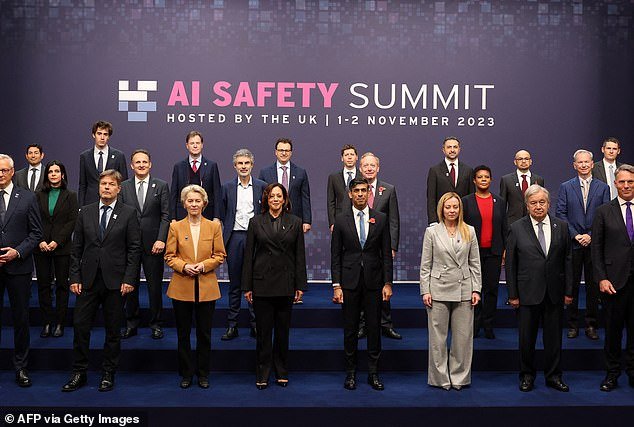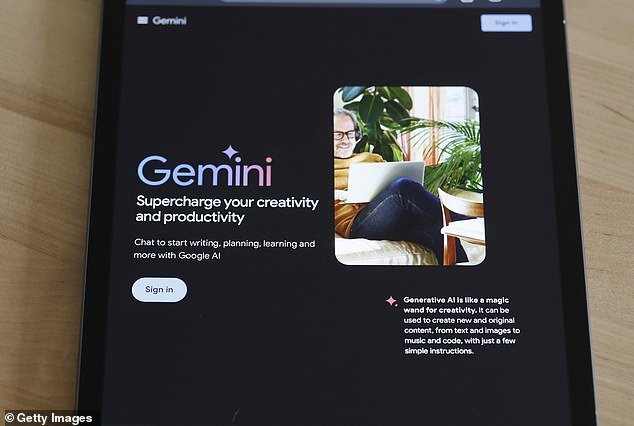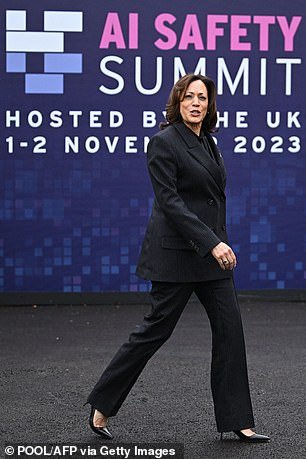‘AI Czar’ Kamala Harris launches bid to protect Americans from racist artificial intelligence: VP demands proof the technology is not biased
Vice President Kamala Harris on Wednesday announced an effort to protect Americans from unregulated artificial intelligence, especially in the area of race.
The vice president shared her concerns with reporters in a press call, noting the need to protect the rights of the American people when using any form of AI in the federal government.
“If the Veterans Administration wants to use AI in VA hospitals to help doctors diagnose patients, they must first demonstrate that AI does not produce racially biased diagnoses,” she said.
To that end, Harris announced a governance rule for government agencies to verify that their use of AI would not be racist or endanger anyone’s rights.
“I believe that all leaders of government, civil society and the private sector have a moral, ethical and societal obligation to ensure that artificial intelligence is adopted and developed in a manner that protects the public from potential harm while ensuring that everyone is able to take full advantage of it,” she said.
US Vice President Kamala Harris traveled to London in November to discuss the future of artificial intelligence

US Vice President Kamala Harris attended the UK Artificial Intelligence (AI) Safety Summit in London in November
She also announced the administration’s requirement that federal agencies disclose which AI systems they were using and how they were using them in their work.
The federal government, she said, would serve as a model for any company or global entity using AI to improve their productivity.
“President Biden and I intend that these domestic policies will serve as a model for global action,” she said.
Prominent universities have identified AI as problematic in terms of race, especially in healthcare.
“Healthcare algorithms that power AI may include biases against underrepresented communities, reinforcing existing racial inequities in medicine, a growing body of evidence shows.” wrote Isabella Backman of the Yale School of Medicine in December 2023.
MIT graduate Joy Buolamwini launched the “Algorithmic Justice League” to combat algorithmic bias, describing it as a “coded gaze” that could impact issues of basic goods and services, including healthcare and law enforcement. She urges companies to prioritize more “inclusive coding” to ensure the end result of AI is not racially biased.
Companies continue to grapple with racial sensitivities when using or deploying artificial intelligence, even as they seek to identify or counter-program racially charged outcomes.
Google apologized after its Gemini AI tool generated images of non-white female founding fathers, black female popes, and black and female Asian Nazi soldiers in response to user queries.

Google’s Gemini Ai has been the subject of controversy for producing ‘woke AI’ images

Google’s Gemini AI generates images of black and Asian Nazi soldiers.
“It’s clear this feature has missed its mark,” said Prabhakar Raghavan, a senior vice president who runs Google’s search engine and other companies wrote in response to the controversy. “Some of the images generated are inaccurate or even offensive. We are grateful for the user feedback and are sorry that the feature did not work properly.’

US Vice President Kamala Harris arrives for the UK Artificial Intelligence (AI) Safety Summit
Google’s critics derided the end result as a product of “woke” AI.
Billionaire tech mogul Elon Musk mocked Google’s AI system as evidence that the company surrounded itself with “insane racist, anti-civilization programming.”
As more companies look for ways to implement artificial intelligence, Harris has seized on the issue as part of her issue portfolio as vice president.
“I think the first part of this topic that needs to be articulated is that AI is kind of a beautiful thing,” she said during one of her first roundtable discussions on the topic. “First of all, it’s two letters. It means artificial intelligence, but ultimately it’s about machine learning.”
In November, Harris traveled to London to participate in an AI Safety Summit and delivered a speech to world leaders.
“Let us work together to build a future where AI creates opportunities, promotes equality and protects fundamental freedoms and rights,” she said.
